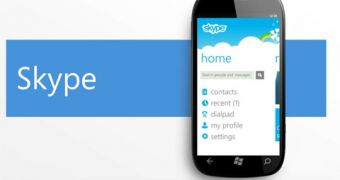Today, Microsoft announced that it would buy Skype for $8.5 billion, in a move that would make the Redmond-based software giant an important player on the telecommunications market.
The general tendency over the past few years was to move from desktop to mobile, with social networking usage on the go being on the rise, and Skype already has a great presence on smartphones and 3G phones.
The experience Skype offers on mobile devices is great, and with the increasing power of newer handsets and tablets, the experience is about to become better.
Android, BlackBerry, iOS or Symbian, all of these platforms have Skype available for them, with Microsoft's Windows Phone being the only one missing from the picture (although Windows Mobile was there).
But that it about to change, especially now, when the said deal is official, and Microsoft becomes the rightful owner of the service / application.
Skype already has a series of deals with various wireless carriers around the world, including Verizon Wireless in the United States.
As one of the most important VoIP companies in the world, with over 600 million registered users and 170 million active ones, Skype would bring a range of patents to the Redmond company through this deal, along with all of the aforementioned partnerships with networks around the world, and more.
“Take free, unlimited Skype-to-Skype calls and IM on the go with your BlackBerry or Android 3G smartphone from Verizon Wireless,” one can read when accessing Skype's website.
Using Skype on a mobile phone to connect to users in the same country or abroad is much cheaper than when using minutes from the monthly plan.
Skype-to-Skype, IM and global calls from Skype mobile won't be accounted against user's monthly plan, which makes the service / application more appealing than what carriers have to offer at the moment.
“We are in the middle of a transition in telecommunications from voice and video being a fixed hardware application to a software application sitting on top of the network,” Andreessen Horowitz, one of the first investors in Skype, reportedly stated.
With the telecoms industry moving towards 4G technologies, which offer great experience at lower prices when it comes to data, phone owners would certainly find it easier and more convenient to take advantage of a VoIP application on their handsets, and Skype might prove to be the answer for many.
However, now that Microsoft put its hand on the VoIP company, it remains to be seen whether the deal would affect users of other mobile platforms beside Windows Phone.
This fall, the latter should receive a load of new features in the next release, dubbed Mango, which would arrive on new hardware, bringing forth features like Windows Live Messenger integration in Peoples Hub.
Microsoft might consider the integration of Skype with the mobile operating system as well. The emergence of Windows Phone devices with front facing cameras and Skype included into the mix would deliver great new capabilities to users.
Windows Phone would certainly have a lot to gain from the deal, but it remains to be seen whether or how much others would have to lose.
Symbian might soon fall into oblivion, but Android, BlackBerry and iOS are bound for growth for the next several years still, and Microsoft might try to cash on Skype's popularity on these platforms. After all, it would be easy to threaten to block their access to the service, after the deal is concluded.

 14 DAY TRIAL //
14 DAY TRIAL //